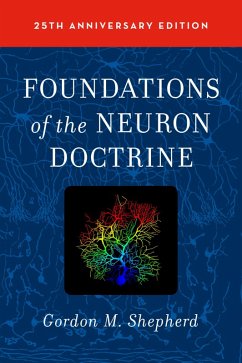
Foundations of the Neuron Doctrine (eBook, ePUB)
25th Anniversary Edition
Versandkostenfrei!
Sofort per Download lieferbar
44,95 €
inkl. MwSt.
Weitere Ausgaben:

PAYBACK Punkte
22 °P sammeln!
The neuron doctrine, first formulated in 1891, states that the brain is constructed of individual neurons, organized into functioning circuits that mediate behavior. It is the fundamental principal that underlies all of neuroscience and clinical neurology. Foundations of the Neuron Doctrine gives an authoritative account of how this theory was the product of an explosion of histological studies and vigorous debates near the end of the nineteenth century by an extraordinary group of scientists, led by Santiago Ramon y Cajal of Spain, using a selective stain discovered by Camillo Golgi of Italy...
The neuron doctrine, first formulated in 1891, states that the brain is constructed of individual neurons, organized into functioning circuits that mediate behavior. It is the fundamental principal that underlies all of neuroscience and clinical neurology. Foundations of the Neuron Doctrine gives an authoritative account of how this theory was the product of an explosion of histological studies and vigorous debates near the end of the nineteenth century by an extraordinary group of scientists, led by Santiago Ramon y Cajal of Spain, using a selective stain discovered by Camillo Golgi of Italy. They were the first to describe the distinctive branching patterns of nerve cells, providing evidence that the cells interact as individual units to form circuits, opposed however by Golgi, who held out for a view that the nerve cells form syncytial networks. Studies in the 1950s appeared to confirm the nerve cell as an individual unit, as embodied in the neuron doctrine, which became the basis for the rise of concepts of normal and disordered neural function since then. This 25th Anniversary Edition is timely. Recent studies are showing a much greater degree of complexity in neuronal organization, so that the debate of neuron versus network is again coming to the fore in neuroscience research. Unique to this Anniversary Edition is the inclusion of commentaries by distinguished international leaders - Marina Bentivoglio, Xavier De Felipe, Sten Grillner, Paolo Mazzarello, Larry Swanson, and Rafael Yuste - on the continuing relevance of the neuron doctrine for modern studies of the brain at all levels, from genes and molecules to microcircuits, neural networks, and behavior. As this new wave of modern studies expands our concepts of nervous function as the basis of behavior, Foundations of the Neuron Doctrine will be a unique source providing conceptual continuity from classical times to the present and into the future. With commentaries from Marina Bentivoglio Paolo Mazzarello Javier DeFelipe Larry Swanson Sten Grillner Rafael Yuste
Dieser Download kann aus rechtlichen Gründen nur mit Rechnungsadresse in A, B, BG, CY, CZ, D, DK, EW, E, FIN, F, GR, HR, H, IRL, I, LT, L, LR, M, NL, PL, P, R, S, SLO, SK ausgeliefert werden.













